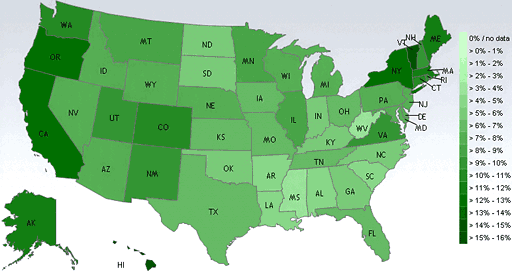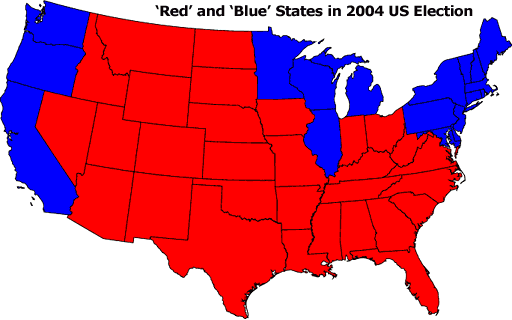I had to smile reading the New York Times' Maureen Dowd's
column on Sunday. I hasten to clarify that I don't read Dowd because I
agree with her politics - I'm in general diametrically opposed to her
views - but she's a skillful, entertaining wordsmith, and it's always a
good idea to keep tabs on what the opposition is saying.
Anyway, this particular piece was about (surprise!) Barack Obama, a
profile of whom Ms. Dowd characterized as "sitting in a cafe, hunched
over the New York Times, an Atlantic magazine, his
MacBook, and some
organic fruit-flavored tea, listening to Bob Dylan's Blood on the
Tracks on his iPod."
What caused me to chuckle was the fact that aside from the New
York Times, which I peruse only sporadically and selectively, that
profile could pretty much be describing me. I've subscribed to The
Atlantic Monthly since forever, and it's my favorite magazine; I
use a PowerBook (several), and my next computer will more than likely
be a MacBook. I'm a fancier of organic tea, and two of my favorite
blends are Fujian White with raspberry and Bergamot (a variety of
citrus) - flavored Earl Grey Green; Blood on the Tracks is my
all-time favorite Dylan album and one of my favorite music albums ever,
and I do have an iPod.
The thing is, my politics are somewhat to the right of Attila the Hun's, and
I probably disagree with Mr. Obama as much or even more than I do with
Ms. Dowd on most matters of any controversy or consequence.
Questionable Association
So what does this all prove? Probably not much, other than the
questionable nature of associating people's taste in reading material,
music, beverages, and computers with their political inclinations.
Well, maybe the reading material angle has some basis. The
Atlantic does try to be evenhanded and has recently included
such estimable and erudite right-wing intellectuals as P.J. O'Rourke
and Mark Steyn on its staff. Now Harpers . . . well,
let's just say I find it difficult to get through an issue of that
without muttering maledictions and throwing the rag across the room.
There are limits to my forbearance...
However I've never been able to accept that there's any inevitable
determinism with respect to a preference for Mac computers and a
predilection for left/liberal political persuasion, even though the
typecasting has become something of a cultural cliché.
It's long been boilerplate conventional wisdom that the Mac is "the
liberal's computer". Steve Jobs is a self-described liberal Democrat,
Al Gore sits on Apple's board of directors, and there's no denying that
the Mac is extremely popular among demographic types generally assumed
to lean toward the liberal end of the political spectrum.
Conservative Mac Lovers
On the other hand, quintessential conservative talk radio icon Rush
Limbaugh has long made no secret of his partiality for the Macintosh,
and it's now been revealed that another prominent conservative is a
consummate Mac fan.
In an
interview with NewsBusters' Matthew Sheffield, Karl Rove,
considered the architect and mastermind behind George W. Bush's (who
has also been reported to be a PowerBook and iPod user) election
victories in 2000 and 2004, has revealed that he is a big fan of the
iPhone and MacBook
Air.
On the iPhone, Rove commented:
"I love it. My life has changed. I have a shred of
coolness. I've got my 3,500 people in my addressbook on the phone, I
can sync my calendar. I keep track of my modest little stock
investments. I can check the weather of my house in Washington, my
house in Florida, my boy at school, my hunt-lease in south Texas. I can
surf the Web, I'm just - I get part of my email there...."
And when Sheffield observed, "Well it sounds like Steve Jobs should
call you up as a spokesman," Rove replied, "There we go, there we go.
And not only that, I also have the MacBook Air which is really cool.
Even my wife is jealous of my MacBook Air.
And perhaps Rove's and Limbaugh's Mac enthusiasm isn't as anomalous
a phenomenon as some might imagine.
Political Leanings of IT Workers
Last March, eWeek's
Roy Mark reported that according to a survey by the Computing
Technology Industry Association and Rasmussen Reports, 35% of IT
workers identify themselves as Republicans and just 26% call themselves
Democrats, and while 40% affirm no party affiliation, an overwhelming
majority - 75% - categorize themselves in the conservative-moderate
range of the political spectrum.
The CompTIA survey also found that IT workers are evenly split
between Barack Obama and John McCain as their choice for the next
president of the United States. However, one speed bump McCain might be
encountering in bonding with computer people is that he doesn't use
one, acknowledging that he's a computer illiterate who relies on his
wife, Cindy, for tech support. It can't be that he's technically inept.
I mean, this guy flew fighter planes, and technically inept folks don't
get the opportunity to do that.
It reminds me a bit of a relative of mine who spent his entire
career as a civil engineer but has never got into using computers. He
just doesn't perceive any need to in his life. Another friend of mine,
a retired senior bishop of the church I belong to and a very
intelligent individual, used to use a PC, grudgingly, in his office,
but vowed when he retired three years ago that he would never get one
of his own, and so far he hasn't. However, it's not necessarily a
generational thing. Another retired priest friend of mine, a
chronological contemporary of John McCain, is an Internet maven who
uses Google intensively.
The Mac User 'Mindset Profile'
On the other hand, also last winter, market research firm Mindset Media published a Mindset
Profile of Mac users based on a study conducted using Nielsen's Online
panel of 7,500 survey respondents.
Mindset placed the typical Mac user in their "Openness 5" category,
defined as folks who
"tend to seek rich, varied and novel experiences
. . . believe that imagination and intellectual curiosity are
as important to life as more rational or pragmatic endeavors
. . . are receptive to their own inner feelings and may
experience life with more emotional intensity,"
Well, maybe so, but I know lots of conservatives who are also Mac
aficionados, and for that matter plenty of liberal lefties who use
Windows. As one of the former cohort, I like to think that using a Mac
is simply a smarter choice than Windows, both because it is objectively
a superior tool for a whole raft of functional reasons, as well as
because it's a quantifiably more pleasant and satisfying environment in
which to spend one's time. I guess that's partly "emotional", but I
don't think it has much to do with narcissistic posturing or
one-upmanship.
I choose to use the Mac because "it just works" is more than just
ad-copy sloganeering, not because it makes me feel personally
"superior", or "cooler than thou", or to make a cultural or political
statement, although I do contend that the Mac OS itself is demonstrably
superior to Windows. The Mac is simply an excellent tool.
Mac Use and Red vs. Blue States
Well, okay, there's also Net Applications
Democrats Vote for the Mac? measuring the usage share of all
Macintosh operating systems in respective US states - the resulting
breakdown bearing a striking resemblance to the US "red/blue" election
map from 2004, with Mac usage in general being higher in
demographically more liberal "blue" states and the heaviest Mac
concentrations being in the Pacific coast states (and Hawaii), New
York, and New England, and the lowest in the southeastern, midwestern,
and plains states, albeit with some "red state" exceptions, notably
Colorado and Alaska, which are among the top ten Mac-using states.

Macintosh market share by state (Nov. 2007, Net Applications).
The ten states with lowest concentrations of Mac-usage are in West
Virginia (3.47%), Mississippi ( 3.70%), Alabama (4.52%), South Carolina
(4.61%), Arkansas (4.70%), Louisiana (4.85%), South Dakota (5.37%),
North Dakota (5.38%), Kentucky (5.46%), and North Carolina (5.74%).

The ten states with the highest concentrations of Mac users are
Hawaii (15.89%), Vermont (15.14%), California (12.83%), Oregon (12.72
%), New York (12.33 %), Alaska (11.87 %), Maine (11.19 %),
Massachusetts (11.19 %), Washington (10.3 %), and Colorado (10.09
%).
Of course, these phenomena may be attributable to something other
than political leanings per se. Economics, education, and even the
number of Apple Stores in a region could presumably play a role. In
general, states with a lower concentration of Mac users also tend to be
ones with lower per capita incomes, and there's that famous Mac price
premium. Education demographics and the number of colleges and
universities located in a state look like other factors that might
impact the findings besides political affiliation, although there is a
considerable degree of crossover.
Oh well, enough of that. I think I'll kick back with a nice cup of
raspberry-flavored white tea, listen to some Dylan, and check out the
latest blogs on The Atlantic's
website on my Mac.




